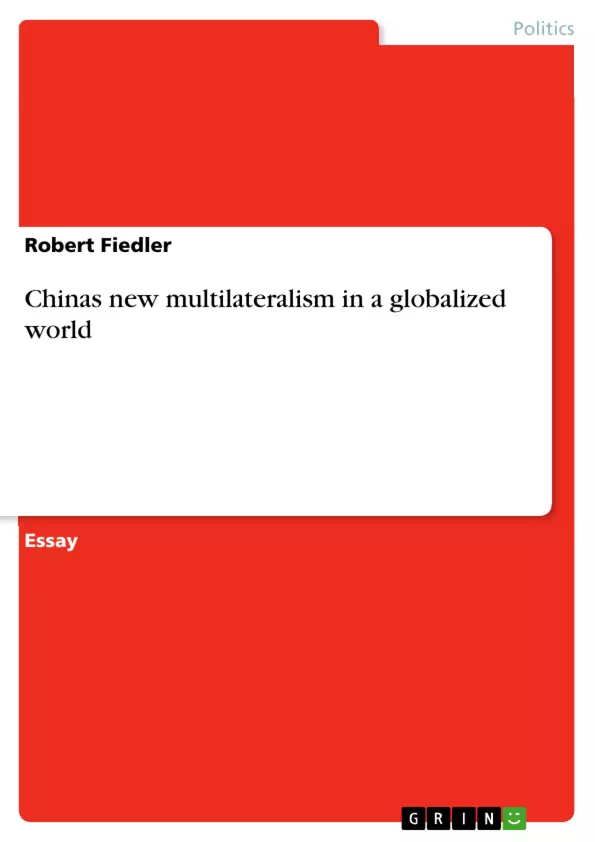During the last two decades China gained rising influence in the international environment. Since this rise is observed by many countries with concerns, Chinese politicians are eager to promote a “less confrontational, more sophisticated, more confident, and at times, more constructive approach towards regional and global affairs” (Medeiros & Fravel, 2003). In other words, China faces the difficulty to become a powerful player in the international system on the one side and to calm the concerns of other nations at the same time on the other side. Therefore, Chinese politicians recognized the importance of multilateral cooperative mechanisms and the shortcoming of bilateral or unilateral approaches to deal with international issues (Wang, 2000, p. 479). Therefore it is not surprisingly that Beijing increased its efforts to participate in international multilateral institutions in order to create win-win situations (Mingquan, 2005). However, in contrast to many western approaches to multilateralism, China emphasizes the principle of sovereignty and non-interference in domestic issues by demanding the acceptance of different political, military and economic domestic systems (Wang, 2000, p. 479). This evolution of foreign policy also accompanies the growing of power and influence and therefore advanced capabilities to safeguard national interests in international relations. Since the security challenges in a post Cold-War era have broadened, the upcoming “great power” China (Kim, 2003, p. 37) extended its engagement in international institutions and multilateral agreements.
Hence, in the following this paper will argue that China’s new multilateralism is subordinated to Beijing’s security interests in a changing globalized world. In order to support this thesis, central multilateral engagements will be analyzed and it will be argued that China’s new approach to international relations utilizes multilateral arrangements to pursue a cooperative security concept which aims at stabilizing of the regional and international environment as well as the combat against new security threats. On the other hand, it will be argued that Beijing’s engagement in multilateral bodies aims at the provision of economic security and therefore is significant contribution to secure and stabilize the ongoing rise of the fastest growing economy in the world. Furthermore this paper will analyze underlying incentives for Beijing’s engagement in these multilateral bodies.
Inhaltsverzeichnis (Table of Contents)
- Introduction
- Cooperative Security
- First, for China the significance of a multilateral security cooperation became obvious in the early 1990's when the former Soviet Union collapsed and several Central Asian countries declared themselves independent
- Since the end of cold war, the approach to security in the Asia – Pacific region shifted from "predominantly bilateral alliances to a multilateral endeavour"
- Economic Security
Zielsetzung und Themenschwerpunkte (Objectives and Key Themes)
This paper examines the evolution of China's multilateralism in a globalized world, arguing that it is subordinate to Beijing's security interests. The analysis centers on China's participation in multilateral arrangements, particularly the Shanghai Cooperation Organization (SCO) and the ASEAN Regional Forum (ARF), exploring how these engagements contribute to China's cooperative security and economic security objectives. The paper also investigates the underlying incentives driving Beijing's involvement in these multilateral bodies.
- China's new multilateralism as a tool for securing national interests in a globalized world.
- The role of multilateral arrangements in achieving cooperative security objectives, including the stabilization of the regional and international environment and the combat against new security threats.
- The significance of multilateral bodies in providing economic security and supporting the ongoing rise of the Chinese economy.
- The impact of globalization on China's security policies and the shift towards a cooperative security concept.
- The underlying incentives driving Beijing's participation in multilateral institutions.
Zusammenfassung der Kapitel (Chapter Summaries)
The introduction establishes the context for China's evolving foreign policy and its engagement in multilateralism. It highlights the challenges China faces as a rising power and its need to balance its growing influence with the concerns of other nations.
The chapter on Cooperative Security explores China's embrace of a cooperative security concept, driven by the changing international environment after the end of the Cold War. The chapter discusses the Shanghai Cooperation Organization (SCO) as a key example of China's multilateral security initiatives in Central Asia, emphasizing the role of the SCO in promoting regional stability and countering security threats.
The chapter on Economic Security focuses on China's economic rise and its interdependence with the global economy. It examines China's participation in the global trading system and its efforts to secure access to markets and resources. The chapter also discusses the impact of globalization on China's economic policies.
Schlüsselwörter (Keywords)
The main keywords and focus topics of the text include China's foreign policy, multilateralism, security interests, cooperative security, economic security, globalization, Shanghai Cooperation Organization (SCO), ASEAN Regional Forum (ARF), regional stability, international relations, and rising power dynamics.
Frequently Asked Questions
What is China's "new multilateralism"?
It is a sophisticated foreign policy approach where China engages in international institutions to promote cooperative security and economic growth while emphasizing national sovereignty and non-interference.
How does China balance its rising power with the concerns of other nations?
Chinese politicians promote a "less confrontational" approach and utilize multilateral cooperative mechanisms to create win-win situations, aiming to calm international fears of its rise.
What are the key multilateral organizations mentioned in the paper?
The paper focuses on China's participation in the Shanghai Cooperation Organization (SCO) and the ASEAN Regional Forum (ARF).
What is the concept of "Cooperative Security" for China?
It involves stabilizing regional and international environments through multilateral arrangements to combat new security threats, particularly following the collapse of the Soviet Union.
How does multilateralism support China's economic security?
Beijing uses multilateral bodies to secure access to global markets and resources, ensuring the continued rise and stabilization of its fast-growing economy.
How does China's approach to multilateralism differ from Western approaches?
Unlike many Western models, China emphasizes the principle of absolute sovereignty and demands acceptance of different domestic political and economic systems.
- Quote paper
- MSc. M.A. Robert Fiedler (Author), 2008, Chinas new multilateralism in a globalized world, Munich, GRIN Verlag, https://www.grin.com/document/163694



